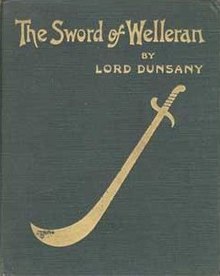|
The Sword of Welleran and Other Stories
The Sword of Welleran and Other Stories is the third book by Anglo-Irish fantasy writer Lord Dunsany, considered a major influence on the work of J. R. R. Tolkien, H. P. Lovecraft, Ursula K. Le Guin, and others. It was first published in hardcover by George Allen & Sons in October 1908, and has been reprinted a number of times since. Issued by the Modern Library in a combined edition with A Dreamer's Tales as A Dreamer's Tales and Other Stories in 1917. The book is a series of short stories. One of the stories, "The Fortress Unvanquishable, Save For Sacnoth", was afterwards (1910) published by itself as a separate book, a now very-rare "Art-and-Craft"-style limited edition. Contents
ReceptionThe Irish Times review described Dunsany's stories as "baffling", but called his style beautiful and his imagination strange but "captivating". It predicted that he would not be popular, but that he would have a cult following. It also praised Sime's illustrations.[1] The Sword of Welleran and Other Stories marked the end of Dunsany's writing about Pegāna and the beginning of a new phase of his career, in which he wrote heroic fantasies in a more modern style. Darrell Schweitzer states that this period included much of his best work.[2] "The Fortress Unvanquishable, Save for Sacnoth" was one of the chief influences on sword and sorcery fiction.[3][4] Another important breakthrough was that Dunsany was writing short stories; heroic fantasy's forerunners were usually lengthy works.[2] References
Sources
External links
|
||||||||||||||||||||||
Portal di Ensiklopedia Dunia
